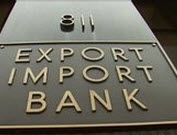
Spending Bill Extends Ex-Im Bank
On Tuesday, Dec. 17, the U.S. House of Representatives approved a series of bills related to spending and other critical, expiring provisions including extending the charter for the Export-Import Bank of the U.S. (Ex-Im Bank). In a 280-138 vote, the chamber sent the fiscal 2020 measure on to the Senate, where lawmakers are expected to clear the legislation, and for President Donald Trump’s signature later this week.
Among several provisions of importance to NSBA and its small-business members—including various tax proposals—is a seven year extension to the Ex-Im Bank’s charter. The legislation would also revise the bank’s small-business policy, requiring the percentage of exports financed by small businesses to rise to 30 percent from 25 percent starting in 2021. The Ex-Im provision directs the bank to guarantee financing for exports that compete with China and to consult with the State Department and other agencies on any transaction over $25 million that involves an entity controlled by China.
As the United States’ official export credit agency, the Ex-Im Bank is a critical tool to support American jobs through exports. Ex-Im Bank helps support U.S. exports—including small businesses—through a range of programs, including guaranteeing loans to foreign buyers, credit insurance and some direct lending to foreign companies. NSBA believes Ex-Im puts U.S. firms—including small exporters—on a level playing field with other countries that similarly offer financing for their domestic manufacturers.
NSBA has been an outspoken supporter of Ex-Im Bank. The prospect of getting financing as an average small business is very difficult and exponentially more so when dealing with foreign buyers as an exporter. Ex-Im Bank is a self-sustaining, independent federal agency that supports and maintains U.S. jobs by filling gaps in private export financing at no cost to American taxpayers. The Bank provides a variety of financing mechanisms, including working capital guarantees and export credit insurance, to promote the sale of U.S. goods and services abroad. Furthermore, almost 90 percent of its transactions directly serve American small businesses.


COMMENTS